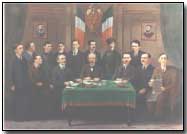The Labour Party (Irish: Páirtí an Lucht Oibre) is a social-democratic political party in the Republic of Ireland. Founded by James Connolly in 1912 as the political wing of the Irish Trade Union Congress, it claims to be the country's oldest continuous political party and can also (unlike the other main Irish political parties) trace a separate link to the original Sinn Féin party. It holds 20 of the 166 seats in Dáil Éireann and is the third largest political party in the State.
In the 2007 general election, it gained 10.1% of the popular vote. As of 2010 the Labour Party has a membership of 12,000. The Labour Party has served in government for a total of nineteen years, six times in coalition either with Fine Gael alone or with Fine Gael and other smaller parties, and once with Fianna Fáil. Currently in opposition, it is the second most successful party of all the parties in Dáil Éireann in terms of time served in government (one year more than Fine Gael). The current party leader is Eamon Gilmore. He was elected in October 2007 alongside Joan Burton, deputy leader.
In 1914, James Connolly, James Larkin and William X. O'Brien established the Irish Labour Party as the political wing of the Irish Trade Union Congress. This party would represent the workers in the expected Dublin Parliament under the Third Home Rule Act 1914. However, after the defeat of the trade unions in the Dublin Lockout of 1913 the labour movement was weakened, and the emigration of James Larkin in 1914 and the execution of James Connolly following the Easter Rising in 1916 further damaged it.
The Irish Citizen Army (ICA) formed during the 1913 Lockout, was informally the military wing of the Labour Movement. The ICA took part in the 1916 Rising. The ICA was revived during Peadar O'Donnell's Republican Congress but after the 1935 split in the Congress most ICA members joined the Irish Labour Party.
The British Labour Party had previously organised in Ireland, but in 1913 the Labour NEC agreed that the Irish Labour Party would have organising rights over the entirety of Ireland. A group of trade unionists in Belfast objected and the Belfast Labour Party, which later became the nucleus of the Northern Ireland Labour Party, remained outside the new party.
In Larkin's absence, William X. O'Brien became the dominant figure in the Irish Transport and General Workers' Union and wielded considerable influence in the Labour Party. O'Brien also dominated the Irish Trade Union Congress. The Labour party, led by Thomas Johnson from 1917, as successor to such organisations as D. D. Sheehan's (independent Labour MPs) Irish Land and Labour Association (ILLA), declined to contest the 1918 general election, in order to allow the election to take the form of a plebiscite on Ireland's constitutional status (although some candidates did run in Belfast constituencies under the Labour banner against Unionist candidates). It also refrained from contesting the 1921 elections. As a result the party was left out of the Dáil during the vital years of the independence struggle, though Johnson sat in the First Dáil.
The Anglo-Irish Treaty divided the Labour Party. Some members sided with the Irregulars in the Irish Civil War that quickly followed. O'Brien and Johnson encouraged its members to support the Treaty. In the 1922 general election the party won 17 seats. However there were a number of strikes during the first year and a loss in support for the party. In the 1923 general election the Labour Party only won 14 seats. From 1922 until Fianna Fáil TDs took their seats in 1927, the Labour Party was the major opposition party in the Dáil. It attacked the lack of social reform by the Cumann na nGaedhael government.
In 1923, Larkin returned to Ireland. He hoped to take over the leadership role he had left, but O'Brien resisted him. Larkin sided with the more radical elements of the party and in September that year he established the Irish Worker League.
In 1932, the Labour Party supported Éamon de Valera's first Fianna Fáil government, which had proposed a programme of social reform with which the party was in sympathy. In the 1940s it looked for a while as if the Labour Party would replace Fine Gael as the main opposition party. In the 1943 general election the party won 17 seats, its best result since 1927.
The party was socially conservative, compared to similar European parties, and its leaders from 1932 to 1977 (William Norton and Brendan Corish) were members of the Knights of Saint Columbanus.


No comments:
Post a Comment